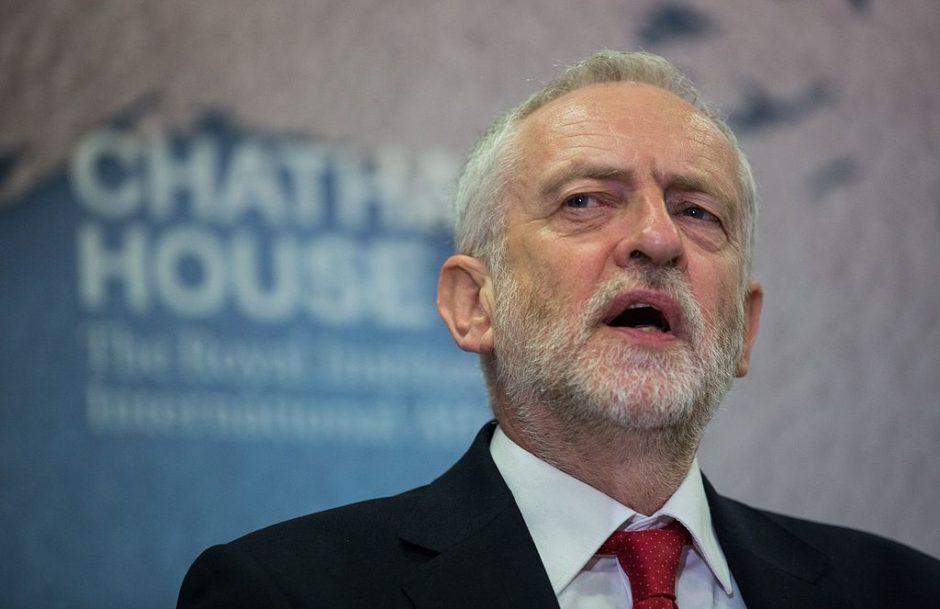Jeremy Corbyn, the embattled 68-year-old leader of Britain’s left-of-center Labor Party, is under fire again.
Corbyn, a dark horse candidate from the hard left of the party, succeeded the middle-of-the-road Ed Miliband in 2015. Since then, he has been busy fending off accusations of being anti-Israel and soft on antisemitic members of the party, which was once supported by the majority of British Jews.

One of his fiercest critics, Luciana Berger, parliamentary chairwoman of the Jewish Labor Movement, has gone as far as claiming that antisemitism is now “more conspicuous, more commonplace and more corrosive” in the party than at any time she can recall.
Corbyn’s defenders claim he has been subjected to a smear campaign. As one observer said, “Corbyn and democratic socialists like him have been anti-fascists for decades, and they, not neo-liberals or the conservative right, have been responsible for leading and winning the major battles against racism internationally. ”
Be that as it may, dissatisfaction with his leadership reached the boiling point late last week when about 1,000 demonstrators massed outside Parliament in London to protest a 2012 Facebook comment he posted that came to light three years ago.
In his post, Corbyn offered artistic support to Los Angeles-based street artist Kalen Ockerman, otherwise known as Mear One. His provocative mural in London’s east end, which has since been taken down, caused an outcry in the Jewish community. It depicted a group of businessmen and bankers, some of whom looked stereotypically Jewish, counting money around a kind of Monopoly board balanced on the backs of dark-complexioned men.
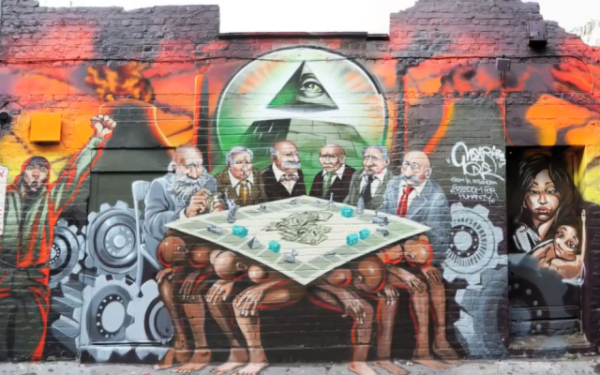
“This mural was classic old fashioned antisemitism,” the editor of The Jewish Chronicle, Stephen Pollard, told The New York Times. Before publishing a story about the objectionable mural, the Chronicle asked Corbyn for his comments. He did not respond, prompting Pollard to conclude he was indifferent to antisemitism. Last week, however, Corbyn voiced “sincere regret” for not having looked closely at this “deeply disturbing and antisemitic” mural.
Corbyn’s apparent indifference to the mural was the last straw as far as two major Jewish organizations were concerned. In an open letter to John Cryer, an influential Labor Party politician, Jonathan Arkush, the president of the Board of Deputies of British Jews, and Jonathan Goldstein, the chairman of the Jewish Leadership Council, accused Corbyn of being tolerant of antisemites.
As they wrote, “We have had enough of hearing that Jeremy Corbyn ‘opposes antisemitism,’ while the mainstream majority of British Jews, and their concerns, are ignored by him and those he leads. He is repeatedly found alongside people with blatantly antisemitic views, but claims never to hear or read them. Again and again, Jeremy Corbyn has sided with antisemites rather than Jews. At best, this derives from the far left’s obsessive hatred of Zionism, Zionists and Israel. At worst, it suggests a conspiratorial worldview in which mainstream Jewish communities are believed to be a hostile entity, a class enemy.”
On the heels of this scathing letter, the Board of Deputies of British Jew and the Jewish Leadership Council, which prefer quiet diplomacy to confrontation, organized the protest before Parliament. Rallying under the slogan of Enough is Enough, the demonstrators vented their anger and disappointment with Corbyn. It was the first time in decades that British Jews had taken to the streets in such bold fashion.
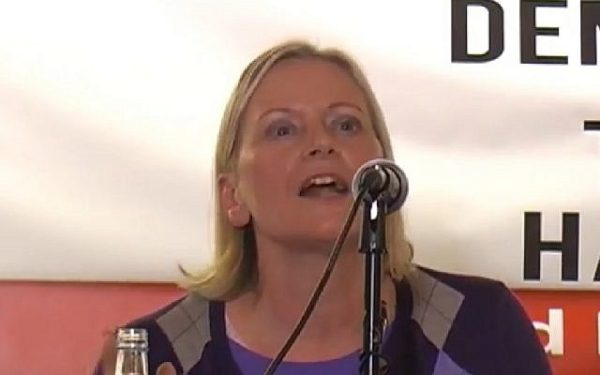
As these events transpired, Christine Shawcroft, a major figure the party, resigned after news leaked out that she had lent her support to a city council candidate who had been suspended following accusations that he had shared an article on Facebook claiming the Holocaust was a hoax.
Corbyn supporters claim that the attacks on him are politically inspired. As The Morning Star newspaper commented, “These accusations have come from the unrepresentative Board of Deputies and the unelected, self-proclaimed ‘Jewish Leadership Council’ — two bodies dominated by supporters of the Tory Party.
“Between now and the local elections the Tories would love to divert the electorate on to accusations of antisemitism against the Labor Party rather than have us discussing austerity, cuts to local authority budgets, the health service, and social care.”
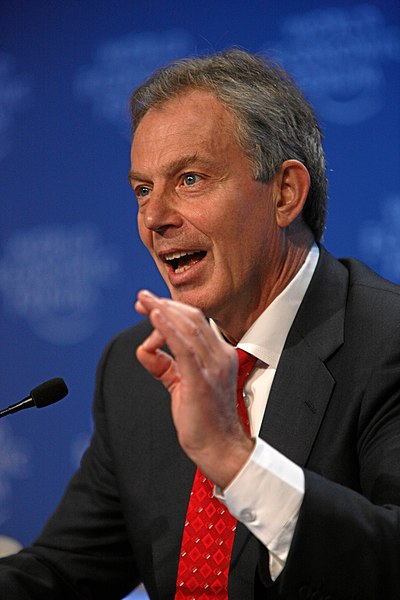
From the moment he was elected to parliament in 1983 as the MP for the London constituency of Islington North, Corbyn steered well to the left of moderate party leaders like Gordon Brown and Tony Blair and established a reputation as a passionate supporter of the Palestinian cause. Nine years ago, when he was still an obscure backbencher, he described Hamas and Hezbollah, which both reject Israel’s existence, as “friends” and hosted their representatives in parliament. Two years ago, Corbyn expressed regret for his remark.
Subsequently, a researcher discovered that Corbyn had been a member of Palestine Live — a Facebook group whose members have posted antisemitic and Holocaust denial materials — from 2013 to 2015.

Corbyn’s election as party leader emboldened Labor backbenchers ill-disposed toward Israel. In 2016, Naz Shah, a Muslim, posted an outline of Israel superimposed on a map of the United States, implying that Israel was an imperialist tool or had no right to exist as a sovereign state. Shah was temporarily suspended from the party, prompting Corbyn’s close ally, Ken Livingstone, the former mayor of London, to malign the Zionist movement by falsely suggesting that Adolf Hitler had been a supporter of Zionism.
Livingstone’s intemperate comment touched a raw nerve, forcing Corbyn to appoint a commission of inquiry to study the issue of antisemitism in the party. Headed by the human rights campaigner Shami Chakrabarti, the commission concluded that while the party was not impregnated with antisemitism, the “occasionally toxic atmosphere” in it posed a problem.
Following Chakrabarti’s report, Corbyn promised to remove any party member caught making racist or antisemitic remarks.
Since last week’s events, Corbyn has gone into damage control mode.
Writing on Facebook and Twitter, he said, “Labor is an anti-racist party and I utterly condemn antisemitism … I will not tolerate any form of antisemitism that exists in and around our movement.”
In another post on Facebook, he wrote, “We recognize that antisemitism has occurred in pockets within the Labor Party, causing pain and hurt to our Jewish community in the Labor Party and the rest of the country. I am sincerely sorry for the pain which has been caused. Our party has deep roots in the Jewish community and is actively engaged with Jewish organizations across the country.”
In an interview with the Jewish News, Corbyn declared, “I’m not an antisemite in any way, never have been, never will be. I’ve opposed racism in any form all my life. It’s the way I was brought up, it’s the way I’ve lived my life.”
He added, “Let me say this very bluntly: antisemitism is a cancer in our society … It has to be challenged at every single stage.”
In closing, Corbyn said he intends to visit Israel at some point in the future and hopes to meet Israeli Prime Minister Benjamin Netanyahu. He also said that he supports a two-state solution to defuse the Arab-Israeli conflict. To achieve this objective, he noted, Israel must stop building settlements and withdraw from the West Bank. “There are many people in Israel who would recognize that there also has to be justice for the Palestinian people,” he said.
Going forward, Corbyn said, he wants to meet British Jewish leaders in the coming weeks to “rebuild confidence” in the Labor Party.
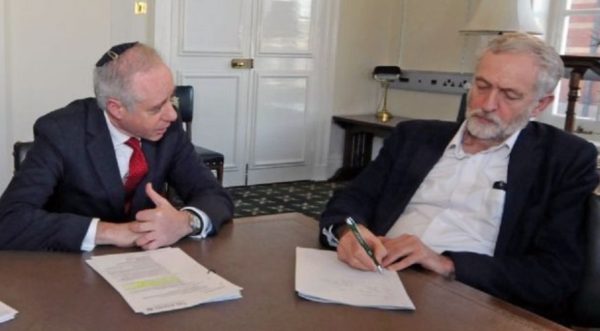
Arkush and Goldstein have said they will not meet Corbyn unless he takes personal responsibility for addressing antisemitism in his party, appoints an independent commission to oversee those efforts and promises not to share a platform with party members accused of antisemitism.
It’s a tall order, but if Corbyn continues to hew to a balanced position on the Arab-Israeli dispute and ejects antisemites from the party without hesitation, he may succeed in convincing some Jews that there is still a place for them in it.
On March 30, the first night of Passover, Corbyn started this reconciliation process by sending his “warmest regards to Jewish communities all over Britain.” In his holiday message, he said he had “always been moved by the Passover story of the Israelite escape from enslavement.”
